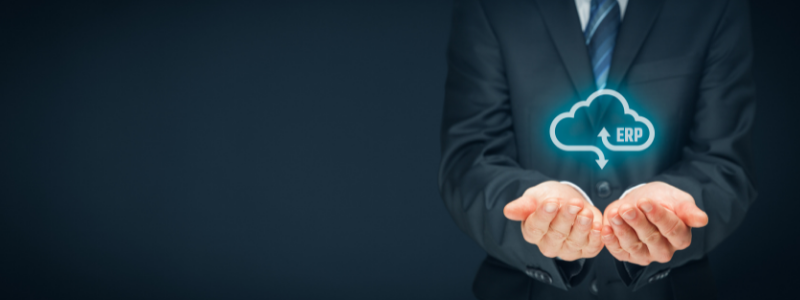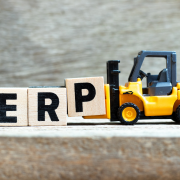What is ERP and How Does It Work?
Business is growing fast and manual processes aren’t cutting it any longer. The old way of doing things is putting you behind and you’re drowning in spreadsheets just to stay on top of it all. If this sounds like you, it might be time to consider implementing an ERP system such as SAP Business One. But just exactly what is ERP and how does it work?

What is ERP?
So, what is ERP and how does it work? Well, it’s specific to each business’s needs. But let us explain.
An ERP, or Enterprise Resource Planning system, is a technology designed to gather and organize business data through one sole integrated software.
ERP systems help businesses unify employees and implement resource planning while automating workflow processes throughout an organization.
Simply put, an ERP puts everything you need to work efficiently in one place!
ERP systems are designed to streamline business processes across all departments within a company by collecting and organizing key business information. Additionally, an ERP binds together the computer systems of each department into one solution that can be accessed by individuals in the organization.
How Does it Work?
ERP software consists of applications that automate business functions like production, budgeting, accounting, human resources, marketing, and more.
In today’s digital age, ERP systems are typically web-based applications that users can access remotely.
ERP solutions merge real-time data into various business processes and workflows across numerous departments in your organization. Management teams and stakeholders can monitor multiple business locations and batch track activity through remote mobile devices in real-time.
To maximize the benefit from implementing an ERP solution, business leadership teams must ensure that data entry is up to date or it will prove ineffective for their business.
What are Some Examples of ERP?
ERP solutions are used across various industries. Different types of ERP are designed to cater to the specific needs of the business.
For example, product and sales-centered businesses, such as cannabis dispensaries, would need system modules like accounting, inventory, sales volume, and customer relationship management (CRM).
Other ERP system modules available include:
- Human Resources
- Warehouse Management
- Risk Management
- Manufacturing
- Marketing Automation
- Workforce Management
- eCommerce
You can view all common ERP integrations here.
Purchase Example
Sales can come in through any number of channels, direct sales, eCommerce sales, B2B portals, and etc.
When this occurs, the ERP system checks the available inventory, looking at on-hand inventory and deducting what may already be allocated. It will also take into consideration items currently on order and when they are expected to arrive. If applicable it can check the inventory across multiple warehouses and fulfillment centers.
If the item is in stock an A/R invoice is generated, and the system is ready to accept payment and update the general ledger.
If the item is out of stock, a notification can be sent to the salesperson or customer with the information on when the item should be in stock.
Assuming the item is in stock, a pick ticket will be sent to the shipping department to pack and ship the item.
At the same time, the procurement department is notified that the item has been removed from stock and if necessary, should be replenished.
In both instances, there is a digital paper trail for accounting and bookkeeping purposes.

Benefits of ERP
There are a few reasons why using an ERP would be good for your small-to-medium-sized business.
Streamline Information and Access
An ERP can provide your business with a common database to get a real-time preview of what’s happening within each sector of the company.
Members of your organization will be able to access and check data such as inventory, sales activity, and delivery schedules all from a single-source system that can be accessed on the sales floor, warehouse, or customer site.
Before the time of ERPs, management teams would have to make endless calls and visits to each business location to get basic information about the activity and state of each division in the company. This process is very time-consuming and inefficient, preventing you from running your business as efficiently as possible.
An ERP system allows productivity to be measured and analyzed to enrich business capabilities, helping you navigate and eliminate repetitive and mundane tasks.
Additionally, implementing an ERP system will allow departments to share information easily with the rest of the organization.
By linking the information and technology from different departments, an ERP blends multiple databases into one system and prevents the use of duplicate and incompatible technology.
Intelligence and Data Security
ERP systems can help you efficiently interpret the data you need to make the right business decisions by taking crucial data and turning it into comprehensive visuals, such as charts and graphs, to help illustrate various business trends and flag business anomalies.
ERP solutions allow businesses to easily produce and access reports such as KPIs (Key Performance Indicators), budget reports, sales trends, and other customized reports using stored data. Having data come from a single source can provide stakeholders with a birds-eye view of the company that would take hours to examine in a spreadsheet.
Additionally, by storing all your data in one place, ERP systems will provide your organization with security by preventing fraudulent practices and data duplication.
Workforce Management and Human Resources
As a business develops, so does the number of employees, size of inventory, and production. It can be extremely troublesome to organize multiple schedules manually. Having an ERP will allow you to organize multiple schedules including employee shifts, inventory delivery dates, key meetings, and more.
Additionally, you can coordinate multiple departments by adding multiple schedules into one single calendar. This way everyone in your organization is aware of any important dates and can prepare for them accordingly.
Customizable Interface
There is no one-size-fits-all ERP and that’s a great thing!
Most ERP software (like SAP Business One) provides tailored modules that properly cater to the needs of your business and allow for modification as the business continues to grow and change.
Software cording modifications can be costly and can make upgrading software much more difficult. Despite these challenges, you’ll be able to use software specifically designed for your organization’s unique and specific needs.

Is an ERP System Right for You and Your Business?
When determining whether an ERP system like SAP Business One is right for your business, here are some questions to consider:
- Does your company have many manual data entry and re-entry processes?
- Do you feel your inventory level and valuation are visible and accurate?
- Are you handling sales orders to cash and procure to pay processes efficiently?
- Is your return merchandise authorization (RMA) and refund process going smoothly?
- Would you like fast and accurate reporting?
- Do you need to automate? Lack of staff/turnover?
Do keep in mind that If not executed correctly, an ERP system will be ineffective for your business.
It’s important to understand the different capabilities, implementation requirements, and choose the right ERP supplier.
Business owners should consider industry-specific ERP solutions and abandon old processes incompatible with the new integrated system. A company using an ERP solution demonstrates a forward-thinking and business-minded leadership team, enticing probable investors and heightening the overall value of your firm.
Ultimately an ERP will improve business operations by removing redundancies, improving accuracy, and increasing communication between organization members. Additionally, automating business processes can improve productivity and allow multiple departments to connect and synchronize workflows.
Support One and SAP Business One
SAP Business One is a sole application that integrates an entire business into one interface, allowing for visibility, data integrity, and efficient workflow.
Used by over 70,000 small and midsize companies, SAP Business ONE can organize your business, helping you achieve all company goals, big or small!
If you’re still left wondering just exactly what is ERP and how does it work, Support One can help.
Contact us to learn more about how we can help with integration, implementation, and support with an ERP system like SAP Business One.










